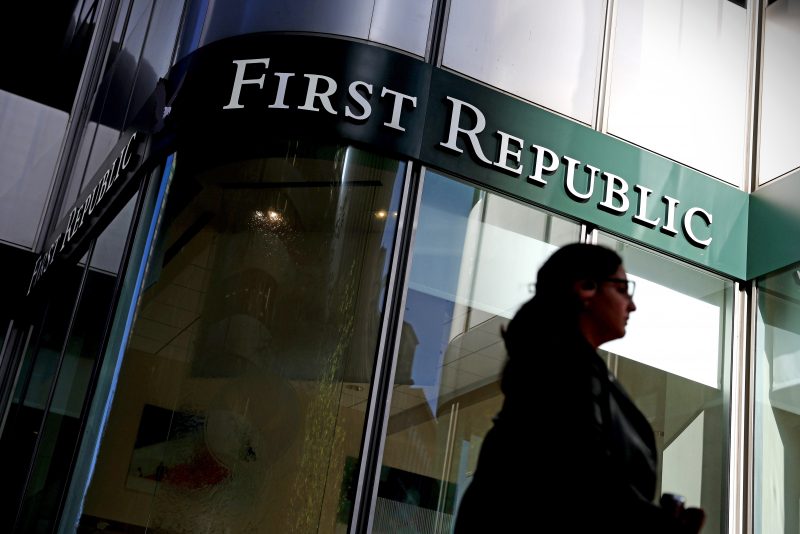First Republic Bank has been taken over by federal regulators and will be sold to JPMorgan — making it the third major bank to go under in less than two months.
The Federal Deposit Insurance Corp. announced simultaneously Monday morning that it had seized the bank and that JPMorgan Chase, the largest bank in America, would be purchasing substantially all of the bank’s assets and deposits.
A spokesperson for the Treasury Department sought to reassure the markets and the public after First Republic, with $229.1 billion in total assets at the time of closure, eclipsed Silicon Valley Bank ($209 billion at the time of closure) to become the second-largest bank failure in American history.
“The banking system remains sound and resilient, and Americans should feel confident in the safety of their deposits and the ability of the banking system to fulfill its essential function of providing credit to businesses and families,” the spokesperson said in a statement.
The intervention comes days after First Republic reported losing about 40% of its deposits in the first quarter of the year. Amid rising interest rates and after the failures of Silicon Valley Bank and Signature Bank this year, a growing cohort of depositors sought to move their money to banks seen as safer and offering more attractive returns.
Among medium-sized banks, First Republic was most affected by the trend: As of mid-March, about 70% of its deposits were uninsured, according to Bank of America, meaning they were larger than the FDIC’s $250,000 guaranteed limit.
That compares with a median of 55% uninsured deposits for medium-sized banks and the third-highest level after SVB and Signature Bank.
Despite a $30 billion infusion from 11 peer banks in mid-March, First Republic couldn’t stop the bleeding: Its stock fell more than 75% over the past 30 days.
The scale of the San Francisco-based lender’s deposit losses were an outlier compared with other regional banks, which saw a roughly 5% decline in deposits on average this year, according to Goldman Sachs Research.
Still, the rapid flight of deposits from First Republic had “created a lot of anxiety across the industry,” said Tim Coffey, managing director at Janney Montgomery Scott, a financial services group.
In addition to the uninsured deposits, First Republic was also carrying many loans with fixed, long-term interest rates that have begun to lose value as the Federal Reserve has repeatedly hiked its benchmark rate.
First Republic had said in a press release last week that it was seeking help to reshape its balance sheet after the massive deposit flight.
On Friday night, the bank said: “We are engaged in discussions with multiple parties about our strategic options while continuing to serve our clients.”
CNBC’s David Faber reported last Tuesday that First Republic had been looking to sell assets to larger banks while it raised additional equity, but it was unclear if other banks would be willing to buy. Bloomberg News also reported last Tuesday that First Republic was looking to sell up to $100 billion of loans and securities to restructure its balance sheet.
The lender had already ruled out a full sale to another bank, Faber reported.
By Friday afternoon, Reuters was reporting that an FDIC seizure was imminent after hopes of finding a private-sector solution fell through.
Over the weekend, the government moved to take bids on First Republic, as the FDIC hoped to announce a closure of the firm alongside a purchase agreement.
JPMorgan Chase was the winner.
“Our government invited us and others to step up, and we did,” JPMorgan Chase CEO Jamie Dimon said in a statement Monday morning. “Our financial strength, capabilities and business model allowed us to develop a bid to execute the transaction in a way to minimize costs to the Deposit Insurance Fund.”
First Republic’s 84 branches in eight states will reopen Monday as branches of JPMorgan Chase.
The FDIC estimates the cost of First Republic’s receivership will be about $13 billion, less than the $20 billion it estimated as the cost from SVB’s failure.

